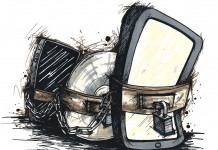 From an Article by David Sarno:
From an Article by David Sarno:
“It’s very common for people to say, ‘Why do I need a library when I’ve got a computer?’ ” said Pam Sandlian-Smith, director of the seven-branch Rangeview, Colo., Library District. “We have to reframe what the library means to the community.”
In the struggle to stay relevant — and ultimately to stay open — libraries are reinventing themselves in ways unimaginable even a few years ago, preparing for a future in which most materials can be checked and read from a home computer, smart phone or electronic reading device.
University and public libraries are rushing to push as much material as they can onto the Web, so patrons can peruse genealogical records, historical maps or rare volumes without leaving home.
[Clip]
Some traditional librarians worry that experiments aimed at making libraries more accessible could dumb them down.
“If you want to have game rooms and pingpong tables and God knows what — poker parties — fine, do it, but don’t pretend it has anything to do with libraries,” said Michael Gorman, a former president of the American Library Assn. “The argument that all these young people would turn up to play video games and think, ‘Oh by the way, I must borrow that book by Dostoyevsky’ — it seems ludicrous to me.”
Others argue that reinvention is a matter of survival in an age when Google Inc. has made the reference desk almost obsolete and printed books are beginning to look more like antique collectibles.
[Clip]
Libraries have been building their digital collections by stocking electronic versions of century-old classics not covered by copyright and so-called back-catalog books unlikely to appeal to book pirates, including an array of “how-to” and other nonfiction titles. But when it comes to bestsellers, the digital cupboard is often bare.
“What the libraries are worried about is being sued,” said Peter Jaszi, a professor of copyright law at American University’s Washington College of Law.
Until recently, the threat of a lawsuit by publishers was a “hypothetical concern” for libraries, Jaszi said. Noting that libraries are among the largest purchasers of books and other media, he said, “Generally it’s bad business to sue your best customers.”
More: Read the Complete Article
Source: LA Times
Via Resource Shelf


































Since I got my e-reader, and discovered that I can download e-books and audible books, I’ve been using my library. They seem to have a better selection of audible books than e-books so I’ve become an audible book consumer. I didn’t start using it until the agency contracts were signed. Many of the book I would have purchased are now out of my price range.
As a teen, the library was my escape. I’d hate to see libraries become virtual rather than physical presences. Of course, I’d also rather see affordable eBooks that are bought so authors can enjoy full royalty payments.
Rob Preece
Publisher
It’s nice to see part of the traditional print world trying to find a way to be relevant in the digital age. This is what will ensure some form of survival. Now if only the traditional publishers would stop trying to force the digital age into an old model.
For genealogy researchers, libraries digitizing old materials are a God-send. Most people don’t have the time and the means to travel to libraries and archives to do their research until they’re retired. By then, many of their relatives have died, taking their information with them. Being able to access the research documents remotely, let people start their research at a much earlier age.
“None of the bestselling ” Harry Potter” books, for example, is available in a digital version.”
Oh, but it is, via bitTorrent. I’m sure if the ebook were legally available, most interested people would buy it. Instead, they’re forced to obtain the pirated version. Dumb decision.
Libraries have a long way to go before a successful and workable model is going to emerge. As far as reference material is concerned I am fully delighted that it is being made available on the web.
But there is a big difference between libraries being innovative in order to service the public who cannot afford full priced books, and spending large budgets for no other purpose than to justify their continued physical existence.
In a future when eBooks dominate I see no reason to maintain large physical building and staff. Some presence will be needed to manage the web sites and to manage paper book stocks which will still remain, but on the web is the future of Libraries.